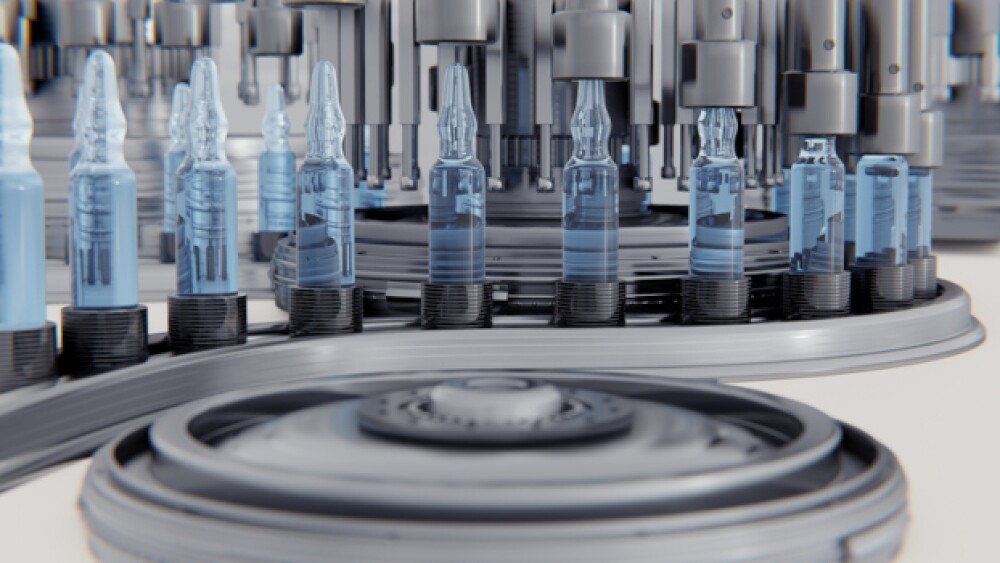Engineers help their employers remain efficient, GMP-compliant and up-to-date on the latest technologies and industry trends.
Pictured: Close-up of medical ampoule production line/iStock, volodyar
In 2022, 15 of the top 20 companies reported a 5.2% increase in revenue to almost $870 billion over the previous year, according to GlobalData Healthcare’s Pharma Intelligence Centre company database. Engineers played and continue to play an important role in driving success in the biopharmaceutical space.
The complexity of biopharmaceutical manufacturing processes requires a highly skilled workforce that includes engineers, who fill many roles across the product life cycle. These include process engineers, validation or facility engineers, automation engineers and operations engineers. “Most engineering roles require a bachelor’s degree in some form of engineering,” said Greg Clouse, recruiting manager at BioSpace. A master’s degree doesn’t provide an added advantage, he noted, but many roles in R&D require a PhD.
Depending on the path someone takes, the education requirements for each role are very flexible, Laura-Ann Chin, director of life sciences at the Barry-Wehmiller Design Group and a member of the International Society of Pharmaceutical Engineering, told BioSpace. Someone involved in engineering design and the building out of pharmaceutical and life sciences facilities will likely need a strong engineering background, such as a degree in chemical engineering, mechanical engineering, electrical engineering or biomedical engineering, she said. Those who approve construction and engineering drawings would typically also need to earn a Professional Engineering license.
“Of all the engineering degrees, chemical engineers have proven to be the most flexible across the life sciences and biotech industries, given the breadth of the major,” Chin said.
Clouse said the salary range for engineering roles in biopharma varies based on years of experience and location. With two to five years of experience and a bachelor’s degree, new hires can expect to make between $100,00 to $120,000 per year. If they are on a coast, it can be more; if they are in the Midwest, it may be less. Managers make about $140,000 to $170,000. Engineering directors are probably making around $200,000 including incentives such as an annual cash bonus and a 401(k) match. “But it really depends on how much experience you have, and what the actual job is,” Clouse said.
Get the free BioSpace 2023 U.S. Life Sciences Salary Report.
Here’s what you need to know about five engineering roles in the biopharma industry.
Design Engineer
Engineers that design and support the construction of life sciences and pharmaceutical facilities typically specialize in building for the industry, Chin said. The industry is governed by stringent regulatory guidelines to ensure a current Good Manufacturing Practices (cGMP) environment.
Years of experience are needed to develop competency in life sciences and pharmaceutical cGMP and facility design, she said.
Process Engineer
Process engineers develop and facilitate the production process, including scale up from the lab bench to full capacity. Their aim is to make production as efficient as possible. Process engineers must also stay on top of emerging technologies and trends within the biopharmaceutical industry.
An understanding of heat and fluid dynamics would allow a chemical or process engineer to design a bioreactor system to sufficiently meet cell culture growth requirements, Chin said. An understanding of mass and energy balance allows these engineers to evaluate the planned operating capacity for a facility, and the requirements to reach that goal.
See process engineer job openings.
Validation Engineer
Validation engineers uphold strict standards around their employers’ safety procedures, quality and compliance, Chin said. They must have a thorough knowledge of cGMP regulations and technological advancements. Validation engineers make sure the manufacturing process remains consistent to ensure the quality of the products manufactured.
See validation engineer job openings.
Facility Engineer
“Facility engineers make sure a life sciences or pharmaceutical facility continues to run in a safe and efficient manner,” Chin said. They interact with the grey and clean utilities that feed into the process equipment, playing a hands-on role in installing, troubleshooting and maintaining equipment such as plant steam boilers, chilled water generators, high-purity water generators and gas manifolds.
See facility engineer job openings.
Automation Engineer
Automation engineers maintain quality control standards during the production process. They ensure advanced quality monitoring tools are used effectively. Automation engineers must be able to meet employers’ current automation demands and predict future challenges.
See automation engineer job openings.
Charlotte LoBuono is a freelance science writer based in New Jersey. Reach her at lobuono2@verizon.net. Update (Dec. 4): This story has been modified to mention that Laura-Ann Chin is a member of the International Society of Pharmaceutical Engineering.





